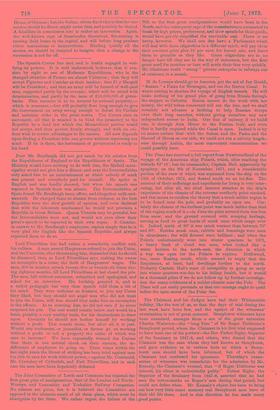Lord Fitzwilliam has had rather a remarkable conflict with his
colliers. A man named Hargreaves refused to join the Union, and the Unionists, after threatening him, demanded that he should be dismissed, thus, as Lord Fitzwilliam says, making the owner an accomplice in a crime, the theft of Hargreaves' wages. The men, 300 in number, struck twenty-five or twenty-six times dur- ing eighteen months, till Lord Fitzwilliam at last closed the pits. The men, left without resources, submitted and apologised, and asked for an interview. His lordship granted it, and in a rather pedagogic but very clear speech told them a bit of his mind. They were welcome as freemen to join any Union they liked, but they should not expel men who did not want to join the Union, still less should they make him an accomplice in the offence. As to coercing him, he did not care if he never reopened his pits. The coal would remain below, and would be a bank, possibly a very wealthy bank, for his descendants to draw upon. Certainly he should not bother himself by working without a profit. This sounds stern, but after all, it is just. Would any tradesman, or journalist, or farmer go on working without a profit, or sell a property the value of which was sure to increase? We have repeatedly warned the Unions
that there is one natural check on their success, the in- difference of employers to going on. Three times within the last eight years the threat of striking has been tried against men too rich to care for work without power,—against Mr. Courtauld, Mr. Crawahay of Cyfarthfa, and Earl Fitzwilliam, and in each case the men have been hopelessly defeated.


































 Previous page
Previous page